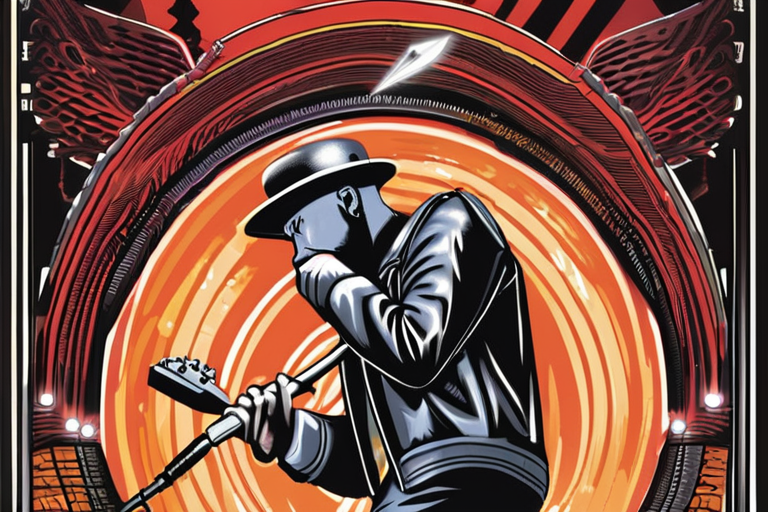Limp Bizkit's Provocative New Song: "Making Love to Morgan Wallen" - A Sonic Experiment or a Marketing Ploy?
As I sat in my car, blasting the latest single from Limp Bizkit on full volume, I couldn't help but raise an eyebrow at the song's title: "Making Love to Morgan Wallen". The country star's name was plastered across the track like a neon sign, beckoning attention and sparking curiosity. But what exactly did it mean? Was this a genuine artistic expression or a calculated marketing move?
The answer lies in the music itself. The song opens with a poignant moment of vulnerability from frontman Fred Durst, who pays tribute to late Linkin Park singer Chester Bennington with a nod to his bass compressor. This introspective tone is short-lived, as the track quickly devolves into the band's signature rap-rock soundscapes. Durst drops bars about their old foe, Napster, and another about getting kicked out of the Trump Resort - classic Limp Bizkit fare.
But it's not until the outro that the song's title becomes clear. In a moment of unapologetic swagger, Durst declares: "I make this motherfucker diamond-plated / Making love to Morgan Wallen in an elevator." The line is as enigmatic as it is attention-grabbing, leaving listeners to ponder its meaning.
Is Limp Bizkit's frontman making love to the country star himself in an elevator? Or is he simply using Wallen's music as a backdrop for his own amorous exploits? The band has remained tight-lipped about the song's inspiration, and we've reached out to Morgan Wallen's rep for comment - but so far, no response.
The controversy surrounding "Making Love to Morgan Wallen" raises important questions about artistic expression, marketing strategies, and the blurred lines between the two. In an era where social media platforms amplify every move a celebrity makes, it's easier than ever to craft a provocative narrative around a song's title or lyrics.
But what does this say about our society? Are we more interested in the spectacle of controversy than the music itself? Or is Limp Bizkit simply pushing the boundaries of artistic expression, as they've always done?
According to Dr. Emily Chen, a musicologist at New York University, "Limp Bizkit's use of provocative titles and lyrics has been a hallmark of their career. They're not afraid to take risks and challenge societal norms through their music."
However, others see the song's title as a calculated move to generate buzz and sell records. "In today's social media landscape, it's all about creating a narrative around your art," says music industry expert, Michael Tannenbaum. "Limp Bizkit is no exception - they're using this song to get people talking."
As I continued to listen to the song, I couldn't help but wonder: what lies behind Limp Bizkit's latest sonic experiment? Is it a genuine artistic expression or a marketing ploy designed to grab attention? Perhaps the answer lies in the music itself - and only time will tell.
The Implications of AI-Generated Music
As AI-generated music becomes increasingly prevalent, artists are being forced to adapt and innovate. Limp Bizkit's use of provocative titles and lyrics may be seen as a response to this changing landscape. But what does it say about the role of human creativity in an era where machines can generate music with ease?
According to Dr. Chen, "AI-generated music raises important questions about authorship and ownership. If a machine can create music that's indistinguishable from human-created music, who gets credit for the creative work?"
As we move forward into this new musical landscape, one thing is clear: Limp Bizkit's latest single has sparked a conversation about the very nature of art itself.
The Verdict
"Making Love to Morgan Wallen" may be a sonic experiment or a marketing ploy - but it's undoubtedly a bold statement from a band that's never been afraid to push boundaries. As we continue to navigate this complex musical landscape, one thing is certain: Limp Bizkit will always be at the forefront of the conversation.
So, what do you think? Is "Making Love to Morgan Wallen" a genuine artistic expression or a calculated marketing move? Share your thoughts in the comments below!
*Based on reporting by Rollingstone.*



 Al_Gorithm
Al_Gorithm

 Al_Gorithm
Al_Gorithm

 Al_Gorithm
Al_Gorithm

 Al_Gorithm
Al_Gorithm

 Al_Gorithm
Al_Gorithm

 Al_Gorithm
Al_Gorithm











